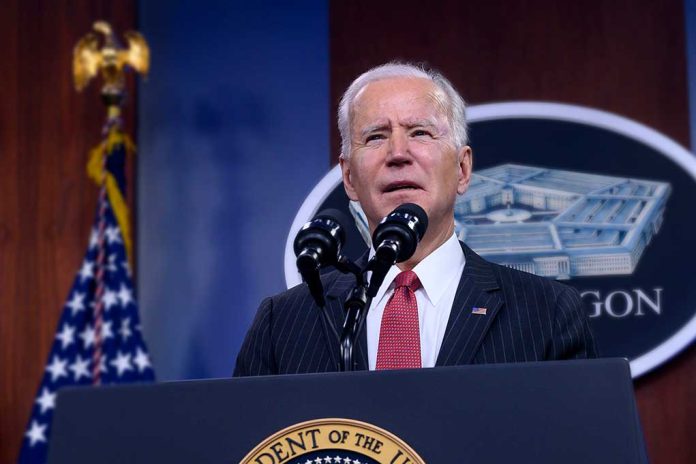
President Biden’s veto of the JUDGES Act sparks outrage among federal court leaders, potentially worsening judicial backlogs and delaying justice for countless Americans.
At a Glance
- Biden vetoed the bipartisan JUDGES Act, which would have added 66 new federal judgeships
- Federal judiciary leaders and lawmakers criticize the veto as detrimental to justice
- The bill aimed to address increasing caseloads and delays in the judicial process
- Biden cited concerns over the allocation of judgeships and political implications
- The veto renews debate on expanding judicial resources without partisan advantage
Biden’s Veto Draws Fierce Criticism
President Joe Biden’s recent veto of the JUDGES Act has ignited a firestorm of criticism from federal court leaders and lawmakers alike. The bipartisan bill, which sought to establish 66 new federal judgeships across 25 district courts in 13 states, was designed to address the growing backlog of cases plaguing the judicial system. Despite passing unanimously in the Senate and with a 236-173 vote in the House, Biden’s decision to block the legislation has left many questioning his commitment to judicial reform.
U.S. District Judge Robert Conrad Jr., a vocal advocate for the bill, expressed his dismay at the President’s action. The veto, according to Judge Conrad, will only exacerbate the already dire situation in federal courts, where nearly 750,000 cases were pending as of June 30th.
The US federal judiciary's leadership called President Biden's decision to veto a bill that would have added 66 new judges to understaffed federal courts nationally 'extremely disappointing' and urged lawmakers to again try to enact the legislation https://t.co/5ss0XkKbHL pic.twitter.com/BGzYA8FSSm
— Reuters Legal (@ReutersLegal) December 24, 2024
Mounting Pressure on the Judicial System
The need for additional judgeships has been a pressing issue for years. Since 1990, the number of cases in district courts has surged by 30%, leading to increasingly longer wait times for justice. This growing burden on the judicial system has not only strained resources but also undermined public confidence in the courts’ ability to deliver timely resolutions.
“The president’s veto will contribute to the pattern of growing caseloads and increasing backlogs that hurt litigants and weaken public confidence in our courts,” U.S. District Judge Robert Conrad stated, highlighting the far-reaching consequences of Biden’s decision.
The Judicial Conference of the United States, recognizing the urgent need for reform, had recommended the addition of new judgeships to address the overwhelming workload demands. This recommendation formed the basis of the JUDGES Act, which aimed to distribute the new positions fairly over time, allowing three future presidents to make appointments without giving any single party an undue advantage.
Biden’s Justification and Political Implications
In defending his veto, Biden cited concerns about the bill’s expedited approval process and the allocation of judgeships. The President argued that key questions regarding the distribution of new positions and the impact of senior status judges and magistrate judges on judicial needs remained unresolved. However, many see this explanation as a thin veil for political maneuvering.
“The House of Representative’s hurried action fails to resolve key questions in the legislation, especially regarding how the new judgeships are allocated, and neither the House of Representatives nor the Senate explored fully how the work of senior status judges and magistrate judges affects the need for new judgeships,” President Biden stated, justifying his decision to veto the bill.
Critics argue that Biden’s true motivation may be to prevent the possibility of future Republican appointments, particularly in light of President-elect Donald Trump’s re-election. This political calculus has not gone unnoticed, with Senate Republican leader Mitch McConnell labeling the potential veto as “spiteful.”
The Path Forward
As the dust settles on Biden’s controversial decision, the question remains: how can Congress address the judiciary’s pressing needs without favoring one political party over another? The veto has reignited discussions on fair expansion of judicial resources, with some lawmakers hoping for the bill’s revival under the Trump administration.
“I used to be a federal court litigator, and I can tell you it’s desperately needed,” House Speaker Mike Johnson, R-La., emphasized, underscoring the critical nature of judicial reform.
While overturning the veto would require a two-thirds majority in both the House and Senate – a threshold the initial House vote did not reach – the urgency of the situation demands continued bipartisan efforts to find a solution. As the backlog of cases continues to grow and access to justice becomes increasingly delayed, the need for comprehensive judicial reform has never been more apparent.






















